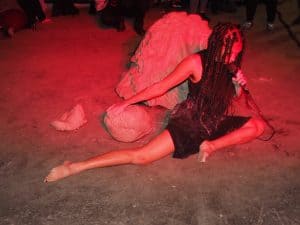by Maya Vivas
As an artist, community member, and co-director of a small non-profit arts organization (Ori Gallery), I’ve not only experienced what it’s like to navigate the Portland arts scene as a person holding multiple marginalized identities, but I am also a witness to what is prioritized, what is celebrated, and what is neglected.
For nearly two years I’ve worked as an arts organizer at Ori Gallery, a collaborative project between myself, Leila Haile, and the Portland Community. We aim to uplift the voices of Trans and Queer Creatives of Color via art exhibitions, community organizing, and mobilization through the arts. Located in the heart of a gentrified neighborhood that was previously a Redlined area of town Ori Gallery is first and foremost about the reclamation of space and prioritizing the leadership of those most impacted by white supremacy, transphobia, and ableism. Our location here is significant because  Mississippi/Albina area is historically black neighborhood and was once teeming with culture of black and brown Portlanders. As it stands right now, out of the 80+ that dwell on Mississippi Ave. the only black-owned spaces are Ori Gallery and the St Joseph Grand Lodge (founded in 1940). Ori Gallery has become an act of radical reclamation and a landmark in a city where working-class creatives of color struggle to make space for themselves.
Mississippi/Albina area is historically black neighborhood and was once teeming with culture of black and brown Portlanders. As it stands right now, out of the 80+ that dwell on Mississippi Ave. the only black-owned spaces are Ori Gallery and the St Joseph Grand Lodge (founded in 1940). Ori Gallery has become an act of radical reclamation and a landmark in a city where working-class creatives of color struggle to make space for themselves.
Within the context of Oregon and Portland specifically, I see an extreme lack of representation by artists who depict the racial, gender and sexual diversity that exists here. Divestment, gentrification, and disenfranchisement have crippled our communities and within that, the cultural production that comes from that very struggle is often co-opted without due credit or compensation. This manifests in the continued struggle for studio space, the closing of smaller artist-run galleries, lack of opportunities and financial support. Most efforts to rectify the need for space feel as though it’s a little too late. The inertia of gentrification has already taken hold and the result is the continued prioritization of business over people. People who create culture. This leads to closures of DIY spaces that deserve just as much attention as any museum. If we seek to view Portland as a cultural hub there must be support for artist-run spaces that lend a platform to those most marginalized. I fear that if we continue down this path, we fail to support the next generation of creatives.
Support for artists means more than commissioning a mural in a gentrified area. Support means giving much-needed resources for the most marginalized artists to explore and develop their own practice. Those in positions of power must be careful to not repeat paternalistic practices and trust that artists know what they need and that they will, by nature, be the creators of culture. When speaking to my community I hear cries for more accessible ways to apply for and receive grants and other means of financial support. When support is given, often times this comes along with a deluge of bureaucracy. Which, for smaller organizations whose members often work multiple jobs to sustain themselves, gets in the way of doing the work or deters one from asking for help altogether. I hear calls for institutions to take the time to talk to people on an individual level and get to know the work up close and personal. For the organizations that do grant financial awards, there is much opportunity to strengthen community via serving as a bridge between grantees. Connecting them to create a cohort that can collaborate and mutually support one another. And to offer more assistance in navigating things such as taxes, accounting, and city bureaucracy.
But we know this already.
When asked to assess something so nebulous as the state of the arts in Portland it is really difficult for me to not come from a place of cynicism. It feels as though our repetitive, calls for resources and support, from the very institutions that claim to be civil servants, are being ignored. So we, as we have done since time and memorial, create our own spaces. Spaces where there is no need for an explanatory comma. I want to be hopeful. I want to live in a reality where my community feels celebrated and valued. This is why we do the work.
As part of RACC’s 2018 State of the Arts report to Portland City Council, three local creatives shared their experiences as artists and arts administrators in Portland. (You can watch their 2018 testimonies here.) This article was written as a current reflection to the “state of the arts” in Portland. What is their experience now? What makes them anxious? What makes them hopeful? What issues do they and/or their communities face as the city continues to change? What is their vision for the future?
Other essays from this report can be read here
Maya Vivas is a ceramic sculptor and performance artist based in Portland Oregon and co-founder of Ori Gallery. Whose mission is to redefine “the white cube” through amplifying the voices of Queer and Trans Artists of color, community organizing and mobilization through the arts.
